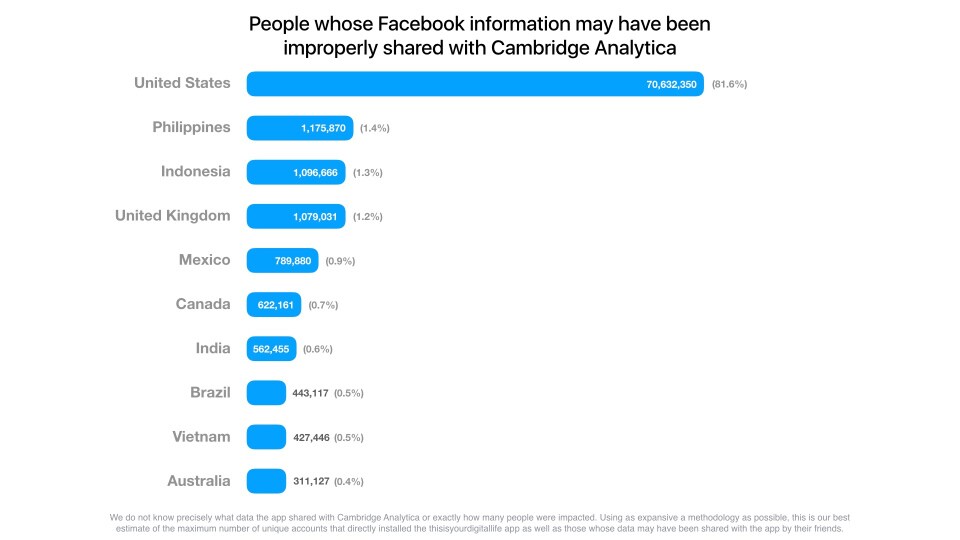Facebook has been on its guard ever since the Cambridge Analytica data scandal broke last month and almost every other day we are seeing some communication from the social media giant.
In its latest update, Facebook has enlisted how it is going to limit data access via restricting API access among other measures.

Representational image. Reuters
"Today, we want to update you on the changes we’re making to better protect your Facebook information. We expect to make more changes over the coming months — and will keep you updated on our progress," said Mike Schroepfer, the chief technology officer of Facebook in the latest update.
Facebook will be controlling the data access that third-party apps have when you use Facebook logins or APIs to connect with them. Facebook has announced nine measures which are as follows.
Events API: Facebook Events lets you add private or public events to your calendar, ticketing or other apps. The Events API also gave access to other people's attendance as well as posts on the event wall by participating members. Facebook wants to ensure that third-parties accessing Facebook Events page use their access appropriately. To ensure this, apps using the Events API will no longer have access to the guest list or the posts on the event wall. Going forward, only Facebook-approved apps which meet strict requirements will be able to use the Events API.
Pages API: So far apps could use Pages API to read posts and comments on the wall of any Page. This also let developers create tools for Page owners which would assist with scheduling posts, replying to comments and so on. And by Facebook's own admission, it also "let apps access more data than necessary." Facebook now wants to ensure that Page information is only shared with those apps which provide useful services to help the community. Going forward all Pages API will need Facebook's approval.
Groups API: Facebook Groups require some form of permission for any app to access them. In the case of closed groups, either the admin or any of the group members can grant that permission and in case of secret groups, only the admin can grant the permission. To prevent the misuse of data being shared on the group, going forward, all third-party apps needing access to Groups API will need Facebook's approval along with that of the admin, and these apps will have to show that they be beneficial for the group. Access to members list of the group will not be permitted, and Facebook will also be removing personal information attached to posts or comments.
Facebook Login: Any app requiring Facebook Login in order for users to access the apps services, will now need Facebook's approval. Any app needing access to information such as check-ins, likes, photos, posts, videos, events or groups will fall under the new approval system. From next week onwards, Facebook will also start removing developer's ability to request data that people shared with them in the past, if it appears that they haven't used the app in three months.
"We will also no longer allow apps to ask for access to personal information such as religious or political views, relationship status and details, custom friends lists, education and work history, fitness activity, book reading activity, music listening activity, news reading, video watch activity, and games activity," said the post.

Facebook feature which will show up atop News Feed from 9 April informing you of connected apps. Image: Facebook
App Controls: From 9 April onwards, Facebook users will start seeing a link at the top of their News Feed which will show which apps they are using and the information they have shared with these apps. People will also be able to remove apps that they do not want. In fact, Facebook even launched a bulk app removal tool to let you delete apps you are not interested in, in batches instead of individually. Facebook has also promised to let people know if their data may have been improperly shared with Cambridge Analytica.
Facebook even slyly slipped in a fact that around 87 million accounts' data may have been improperly shared with Cambridge Analytica. This is around 37 million more Facebook users than what was initially revealed. And around 5.6 lakh Indians are also included in his list.
Call and Text history: Facebook was under a lot of pressure after it emerged that Facebook allegedly harvested call and SMS logs and even logged the duration of your calls. According to Facebook, call and text history is an opt-in feature and meant for people using Messenger or Facebook Lite on Android which helps it place the people you most often connect with, right on the top of your contact list. Facebook says that it does not collect the content of the messages and has promised to delete all logs which are older than a year. In the future, Facebook will not accept data such as duration of calls.
Search and Account Recovery: Facebook will be disabling the feature which let you search for someone using their mobile phone number or email address. According to Facebook, this feature was allowed as it made searching for friends or acquaintances easy, especially in scenarios where it was difficult to type out a name in a different language or where there were chances of a name being too common. But Facebook thinks that a lot of malicious actors may have used this feature to scrape public profile data from gullible Facebook users who may have shared it on the platform. Facebook will also be making changes to account recovery to reduce instances of data scraping.

Facebook information which may have been improperly been shared with Cambridge Analytica. Image: Facebook
Data Providers and Partner Category: Facebook has shut down Partner Categories which enabled third-party data providers to offer their targetting directly on Facebook.
Instagram Platform API: This was an update that was announced on the Instagram towards the end of January, and it will be effective from today onwards. Starting today, Facebook will be disabling certain Instagram features that were available to third-party Instagram apps. For instance, third-party Instagram apps will no longer be able to see follower lists, likes, relationships and public comments. From 11 December onwards, Instagram will not allow apps to read public content and from early 2020 apps will not be able to read a user's profile information and media.
"Overall, we believe these changes will better protect people’s information while still enabling developers to create useful experiences," concluded Schroepfer while adding that there is still a lot of work to be done and users would be kept updated when more changes are made.
Published Date: Apr 05, 2018 10:14 AM | Updated Date: Apr 05, 2018 10:29 AM